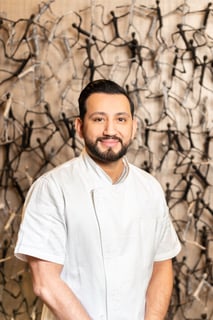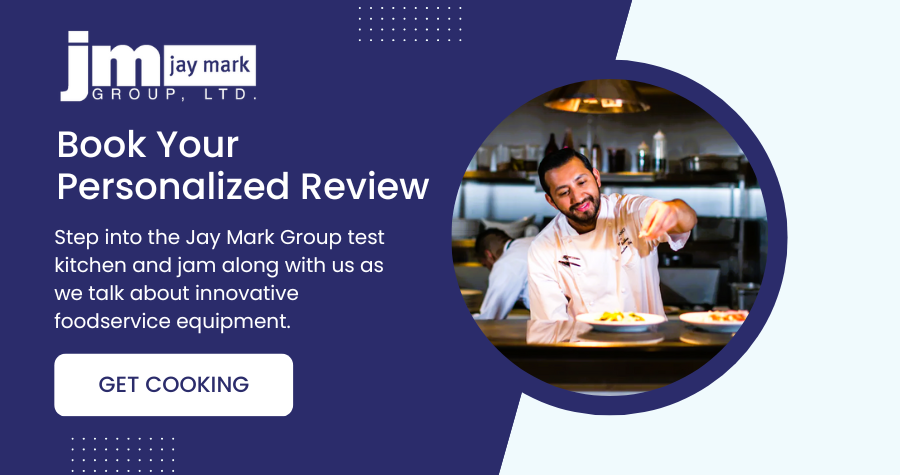Meet Our New Corporate Chef, Tony Roldan
As leaders in Chicago's foodservice industry, we understand the value of having culinary experts in our test kitchen. That's why we're excited to announce the hiring of our new corporate chef and business developer, Tony Roldan.
Tony comes to the Jay Mark Group with a ton of relevant experience in a variety of different kitchens. We sat down with him to learn a bit more about his background and how that will translate to benefits for our customers.
 Chef Tony, can you share a bit about your culinary journey and what inspired you to pursue a career in the culinary arts?
Chef Tony, can you share a bit about your culinary journey and what inspired you to pursue a career in the culinary arts?
As a child, I was influenced by watching talented chefs from around the world on television. I fell in love with how the chefs took creativity to another level by showcasing beautiful vibrant colors with their dishes which piqued my interest in the culinary arts. Since my childhood, I have had a creative and artsy side which I get to express through my passion for cooking. I began my culinary journey by attending Le Cordon Bleu CHIC in Chicago. I worked in the infamous Moto restaurant. At Moto, I learned techniques, creativity, and working with accolades. This experience helped me move up the ranks in various creative kitchens and luxury hotels.
With your extensive experience in luxury AAA 4 and 5-star hotels and resorts, could you highlight a memorable moment or achievement that stands out in your career so far?
The grand opening of Virgin Hotel during the pandemic has challenged me to my maximum potential as a chef. I began from ground zero with four kitchens to open. The hotel had four different international menus with little to no staff, and it was quite challenging. Despite all the challenges we faced working 16-hour days with my direct reports, we drew the perfect flow chart game plan within two weeks before opening day. We were able to hire the right staff to launch the grand opening with no problem! Taking on this challenge has given me the opportunity to re-open more restaurants/hotel outlets.
In your role as a Consulting Chef at Loews Chicago Hotel, you mentioned managing and developing a staff of 10-15 cooks. How do you approach leadership and team development in a high-pressure environment?
As an executive chef, I have been able to successfully manage a kitchen staff of diverse backgrounds and personalities. In high-pressure environments, I worked closely with the cooks and direct reports to create unique dishes. I developed daily meetings where everyone could have the opportunity to offer their ideas and suggestions. Having an open dialog helped us become a better and more communicative team.
During your tenure as the Executive Chef at Virgin Hotels Chicago, you were responsible for managing multiple outlets. What strategies do you employ to ensure consistent quality across different dining experiences?
My strategy was plain and simple. This consisted of organization, being detail-oriented, effective communication, and education.
The Cerise Rooftop Enclosure Project at Virgin Hotels sounds intriguing. Can you tell us more about the project and how it impacted the overall dining experience?
Our two-million-dollar project was developed within a year of researching a profitable seasonal enclosure that would promise an ROI within three years. The enclosure elevated our dining experience by offering a brunch menu all year around, increasing profit by 30 percent in Q4 and Q1, which are typically our lowest rooftop revenue drivers during winter.
You've worked in various capacities, from Lead Line Cook to Executive Chef. How do you think your early experiences have shaped your approach to culinary management today?
In many professional kitchens, I have learned how to balance different personalities and backgrounds. I’ve handled tasks without experiencing emotion, which keeps everyone’s morale high. I learned how to delegate tasks to the right people who can execute the task.
Your time as a Chef de Cuisine at the Sheraton Chicago Hotel involved creating and implementing new menus. How do you balance creativity and practicality when designing a menu for a diverse audience?
Research and development for both English and Spanish audiences have given me the opportunity to experiment with different ingredient combinations using whatever resources we discovered to create new international menus.
You've mentioned being fluent in both English and Spanish. How has your bilingualism influenced your interactions in the culinary world, especially in high-volume establishments?
The ability to be bilingual has given me the opportunity to become a better communicator with the kitchen staff. It helped me create a sense of familiarity and friendship. My bilingual kitchen management skill opens up more opportunities in the kitchen. Learning more about staff and their needs helps build trust and loyalty.
What aspects of the culinary arts do you find most challenging, and how do you stay innovative in your approach to menu development and culinary trends?
I am most challenged with staff who don’t have the passion and the desire to work well as a team player. My drive for success in menu development is determined by the Big 4: seasonal ingredients, technique, R&D, and an inspiring team who have a drive with a true passion for cooking and are eager to learn more.
Having received various awards and recognitions, such as the Dinners Best Choice Award for brunch at Virgin Hotel Miss Ricky’s, how do you maintain a standard of excellence in your culinary creations?
It’s important that we push the boundaries and step ourselves away from standard cooking to create our own version of culinary trends. I constantly experiment with new indigenous ingredients, vendors, and collaborate with other chefs to exchange ideas to execute a seasonal dish for the menu.
You've emphasized the 80/20 rule in your management approach. Could you elaborate on how you apply this principle to achieve success in your role as an Executive Chef?
I apply 80/20 to everything I do, including my personal life when I am not in kitchens. For example, I am the 20 as executive chef, and my team is the 80. As a leader, I want to implement the game plan (Action) for my team to get the (Result) I’m looking for in terms of execution. Now, if I was the 80 and my team was the 20, that wouldn’t make sense in terms of execution, and it would cause the job to become lopsided in terms of planning and executing.
Example: If you make Pico de Gallo, how would you go in terms of preparation for applying the 80/20 rule? Ingredients: Onions, jalapeno, cilantro, onions, tomato, limes. Which of the 6 ingredients will take the longest to prep as the (20) in the rule? The answer would be tomatoes as a larger volume to prep compared to your other ingredients. The other ingredients fall on the 80 because they take less volume to prep versus the tomato, which has a larger volume. Your tomatoes dictate the flow of preparation vs. the other ingredients because you prepped the larger volume ingredient first.
How do you stay updated on emerging culinary trends and technologies, and how do you incorporate these into your culinary strategy?
R&D gives me the opportunity to keep learning and growing as a culinary professional. Practicing my techniques with new ingredients opens the door to new ideas in terms of menu execution for the season. Reading literature about cooking and equipment helps me stay informed about the culinary trends in the field.
In your opinion, what are the key qualities that set a great chef apart, especially in the dynamic and demanding environment of foodservice?
Be a leader, kind, respectful, understand the situation, and be true to yourself with a unique approach. Expose everything you know to teach others and be open-minded and eager to learn more.
What goals do you have for the culinary department in your new role, and how do you plan to achieve them?
With 20 years of experience, I would like to expose our manufacturers to the Chicago market, present them to our local Chicago chefs, and demonstrate how they can maximize the equipment to create wonderful food. My plan is to educate myself with the equipment and maximize our top 5 most-selling brands to their full potential with a unique, refined food approach.
What’s your favorite meal to prepare?
As a trained French chef, I’ve always loved luxurious ingredients when I cooked for clients and myself. My favorite meal to prepare is a lightly roasted halibut in a shellfish sauce with a beautiful 28-day dry-aged duck breast and foie duck jus, accompanied by braised Swiss chard/kale with borlotti beans in its own broth, and a beautiful cheesy potato pave.
Okay, what time is dinner served? We'll be right over. Thanks, chef, for these amazing insights. We look forward to inviting all our Jay Mark Group customers and partners into the test kitchen for an opportunity to work with Chef Tony.



